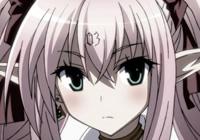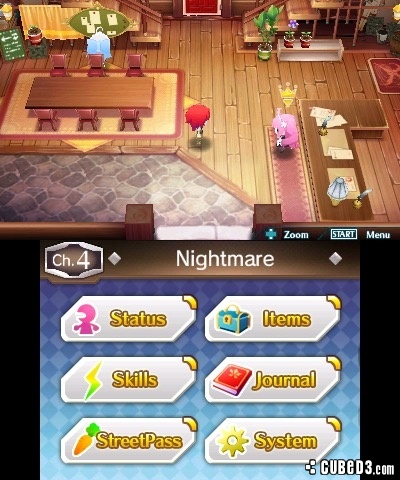Lord of Magna: Maiden Heaven (Nintendo 3DS) Review
By Rudy Lavaux  09.07.2015
09.07.2015

The tale of the development of a game is sometimes an adventure in and of itself. The game at hand, Lord of Magna: Maiden Heaven, was almost met with a terrible fate. Developer Neverland, who made the quite good Rune Factory 4 for the 3DS already, closed its doors not long after that game was completed, and while development of Lord of Magna was all but finished. Publisher Marvelous managed to reunite part of the team, getting some key people involved, and pushed to finish the game for release. Such a troubled development cycle would, in most cases, have put an end to the story before it even managed to reach shelves. In this particular case, however, the final title was quickly wrapped up with a minimal team at the helm and launched in Japan and North America, while Europe has to make do with a digital-only release on the 3DS eShop. Since it's here at last, it's time to dive in and check out how well the small team did in finishing this off.
Right from the start, what stands out immediately is the graphical style. Made in a sort of Bravely Default-ish way, the real-time 3D environments are designed to look like hand drawn from afar but are actually really in full 3D, highly detailed, while the characters appear at first to be chibi-styled 3D models with minimal detail. However, from the limited angles at which they are presented, to the lower amount of frames of animations compared to the rest, it becomes quickly apparent that they are merely 2D sprites, pre-rendered from appropriately detailed 3D models of the characters. The illusion is almost perfect, and the two different render methods do not clash with each other too hard, leading to an overall presentation that leaves a very positive impression. That is until the 3D effect is turned on. The first feeling is that the force of the 3D isn't strong with this one. As it turns out, the development team went not for what has become the traditional style of 3D on the 3DS, which leans more towards giving depth to the scenes, but more towards the "popping-out of the screen" one. Unfortunately, it doesn't work quite as well. Not only is it hard to notice it, even with the 3D slider pushed all the way up, but the 3D effect gets easily broken.
This is caused by the text boxes and characters portraits during dialogue sequences, for the most part. These are rendered in such a way that both images, for each eye, are the same as far as those 2D parts of the image are concerned but this means that some pieces of the scenery seeming to pop out of the screen (and, therefore, being placed in the foreground compared to the text boxes) are actually drawn behind, despite them supposed to be appearing closer to the eye, which breaks the effect altogether. This is a clear oversight on the part of the development team, as this has no risk of happening in other RPGs that go for the depth effect instead, where things appear to be far away in the distance and to always be farther behind the text boxes. In the latter cases, the effect doesn't get broken. This means that, sadly, those exquisitely detailed lush environments will be better enjoyed with the 3D effect turned off.

This is unfortunate, but one of several good aspects riddled with disappointing titbits that can be found within, sadly. Moving along, it plays a bit like a Fire Emblem game would. More precisely, like Fire Emblem Gaiden for the Famicom did, where the player is allowed to roam around certain places freely in-between battle chapters, chatting with other characters and controlling their character in a more traditional overhead RPG way, whereas the battle scenes allow the gamers to control each person separately, one by one, alternating turns with the enemy units, or parties thereof. One of the main differences is that characters are allowed some range of movement each turn, not unlike Phantom Brave, and the actions they are allowed to perform each turn, such as parrying, attacking, or using special moves, require AP - Action Points - that can in turn be built up by only moving on character turns and not performing any specific action other than waiting to end their turn. Enemies come in parties, led by a commander surrounded by minions. The stand-out feature of the battles is how the characters knock minions around, making them roll into one another, forming combo chains. If 10 or more enemies are knocked down in one turn of action, that character gains an extra turn, so aiming ally hits just right so that enemies will fall down like dominoes, causing chain reactions, will be part of the fun, and it proves to indeed be incredibly fun, at least to start with.
Unfortunately, as the game progresses, the story takes its sweet time to develop, and the gameplay, chapter after chapter, doesn't change much and becomes ultimately hard to bear due to its repetitiveness. Quick story progression would have alleviated this somewhat, but disappointingly that is not the case. The premise is that of a young man named Luchs who inherits an inn and promises his late relative to protect at all costs, as well as to continue to run, even though nobody ever comes to stay at it.

If he should ever receive guests, he would have to treat them as no less than family. A noble leitmotiv, which unfortunately gets thrown out again and again, ad nauseam, as the hours go by. The hero, in the most cliché way possible for a JRPG, meets a quite pretty pink-haired girl in some cave while hunting down crystals (which he sells for a living since the inn doesn't exactly make him any money). Naturally, the girl proves to be an…wait for it…amnesiac (anyone having played some JRPGs in the last two decades saw that coming from miles off) and within just a few minutes from the beginning of the game, she starts calling the hero master, he takes her in, and she finds herself put inside a maid outfit for the pleasure of the eye of the many manga/anime/JRPGs aficionados out there.
If this sounds overblown, well it has to be experienced to be believed. This game, unfortunately, is a true textbook case of tropes of the harem-based manga served to otaku and doesn't do much to stray too far from the codes of the genre. The apparently main story of a bunch of mysterious maidens with incredible powers, being drawn by the ability of the bracelet the hero wears, seems to take far too much of a backseat while the player gets served with lots of love innuendo, bordering on the sexual end of the spectrum. What the majority of players would find to be the most interesting part of the story, doesn't progress fast enough to keep their attention as the characters spend much of their time sitting down, repeating that they consider each other to be family, and everything is done to indicate that the hero will end up with one of the girls, if not all of them at once.

Hence why the otherwise fun mechanics of battles, which fail to evolve quickly enough past their initial basic elements, seem to get boring even faster than they would if the main story at least kept people coming back for more, but it develops too slowly for that. Make no mistake, though, if a fan of the genre and scenes like these, there will certainly be lots of fun to be had through what story it tells. A lot of the dialogue and comments that the hero makes while examining certain objects, and so on, would make a great Shonen manga, actually, but it does feel out of place, and not the proper motivation to keep battling to progress further. The fans of that manga stuff will see little relation between the serious battles and that content, while the fans of the more serious main story and battles will have a hard time sitting through the manga-style subject matter.
These are the main problems with Lord of Magna: Maiden Heaven. It is certainly not a bad game by any means. Some things just don't quite sit well with one another, though, and the package feels kind of messy overall. To further illustrate that, the dialogue isn't fully voiced, with some lines here and there, but not even always the most important ones are fully voiced, and then the game goes back to silent mode. A lot of things that could use some well deserved explanations are left for the players to figure out, like the need to buy their stuff from a machine found within the hero's inn (how that makes sense that hero has to pay himself for what should be his own stuff to begin with is left as is, and is sure to cause some big facepalms when found out). The music is pleasant overall but the same tracks come back a lot, where some more varied battle themes would have been welcomed. Overall, Lord of Magna is entertaining, downright fun, sounds mostly good, and is undeniably beautiful from the outside... but it's held back by a messy execution in the end, which, it can only be presumed, was caused by a troubled development cycle and the disbanding of the team behind it.

Cubed3 Rating
Good
A troubled development cycle seems to have, unfortunately, hampered what could have otherwise been an above average, peculiar turn-based strategy RPG. Lord of Magna: Maiden Heaven is a tough call. It clearly has its flaws, and pretty standout ones at that, and the overall atmosphere of the game is a bit too far into the cliché area of the JRPG genre, and yet, it has its moments where it shines. The centre of the adventure - the cast of heroines - is very attractively designed and the different situations they are put in, if cliché to the point of being grating at some moments, can be extremely fun at other times. The basic gameplay of the battle sequences - knocking enemies down like dominoes - is a neat idea, fresh enough to be saluted, but ultimately very repetitive, and the pace of some chapters is extremely sluggish. The game succeeds at entertaining, and the story is just interesting enough to keep players willing to look past its flaws and come back for more, even if in short bursts, but those should know beforehand what they are getting into from the above review, to avoid any potential huge disappointment from going in with high expectations from the flashy and excellently crafted visuals. There's good and not-so-good to be found within, more good than not-good, in fact, making it a tough choice. Those who will manage to look past its flaws are certain to find some good enjoyment herein but the less patient may be a bit bitter about their investment, unless they play it in short bursts over a long period of time so as to not become too exasperated by the issues.
Comments
Comments are currently disabled

 Sign In
Sign In Game Details
Game Details
 Out now
Out now  Out now
Out now  Out now
Out now  Out now
Out now  Subscribe to this topic
Subscribe to this topic Features
Features






 Top
Top

